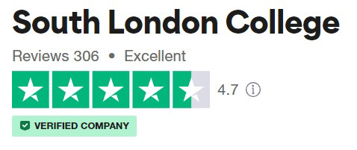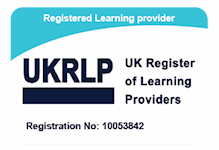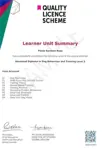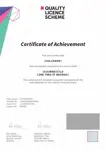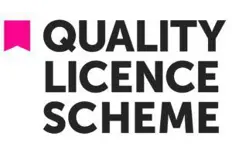
Central Banking Monetary Policy & Banking
Endorsed by Quality License Scheme | Endorsed Certificate with Unit Summary Included
South London College
Summary
- Exam(s) / assessment(s) is included in price
- TOTUM card available but not included in price What's this?
Add to basket or enquire
Overview
Diploma in Central Banking Monetary Policy - Level 3 & Diploma in Banking - Level 3
Develop Interest in Banking and Make Substantial Progress in Life!
Are you dreaming to pursue a career in a government agency or in the banking industry? Then this course is for you. This two-in-one bundle course Diploma in Central Banking Monetary Policy and Banking will enhance your knowledge on how to critically evaluate current and major practices of banking and finance, how to manipulate numerical and financial data, and the ability to apply statistical and mathematical concepts along with many other aspects. So, why wait any further? Make your dream job a reality by registering yourself to our Diploma in Central Banking Monetary Policy and Banking course bundle offered by South London College.
Central banks or the currency boards are the main authorities involved with the monetary policies of a country. These monetary policies influence the money supply of a country and is an essential area of study to understand economics. If you came here wanting to learn about monetary policies and how it is implemented within an economy, this Diploma in Central Banking Monetary Policies – Level 3 is all you need! This course mainly aims at individuals aspiring to get into or already in government agencies, state banks, central banks, business consultancies, and finance, provided they have a recognised qualification at Level-3 or above in a related discipline.
Starting with the essence of central banks within an economy, this detailed course will explain the functions of a banker and advisor to the government. All the functions of the banking system will be relayed through this course, after which the preceding modules will enlighten you on money management, money creation and monetary policy framework.
This course will help you understand how an open economy works and how activities in an open economy affect monetary policies. You can also use this knowledge of monetary policies to make effective business decisions or to help your management. By the end of this course, you will be confident enough to successfully apply the practical knowledge on monetary policies within an organisation.
Similarly, the second course in this bundle, Diploma in Banking – Level 3 will help you get into the competitive industry of banking. A career in banking is desired worldwide due to its high pay, job reputation and many other associated job benefits. This banking course will get you acquainted with all the necessary banking principles and concepts to help you advance your financial modelling career or to help you expand your education in the area.
Many types of banks operate within a given economy, with each bank having different customers and providing different banking services. This course is set to explore all of these banking structures and its services, followed by modules that will discuss the principles and procedures of the business information systems. This course will also make you an expert in analysing business activities and forecasting financial projections. By the completion of this course, you will walk away with an accredited certification that will help you make substantial progress within the banking industry.
These courses have been endorsed under the Quality Licence Scheme (QLS). This means that Imperial Learning Limited* has undergone an external quality check to ensure that the organisation and the courses it offers, meet defined quality criteria. The completion of this course alone does not lead to a regulated qualification* but may be used as evidence of knowledge and skills gained. The learner unit summary may be used as evidence towards recognition of prior learning if you wish to progress your studies in this subject. To this end, the learning outcomes of the course have been benchmarked at Level-3 against level descriptors published by QLS, to indicate the depth of study and level of demand/complexity involved in successful completion by the learner.
These courses have been designed by Imperial Learning Limited* to meet specific learners’ and/or employers’ requirements which cannot be satisfied through current qualifications.
QLS endorsement involves robust and rigorous quality audits by external auditors to ensure quality is continually met. A review of courses is carried out as part of the endorsement process.
Eligible for TOTUM card - TOTUM is the #1 student discount card and app giving you access to exclusive student deals on food and fashion, tech and travel, and everything in between.
*South London College is an approved reselling partner for Quality Licence Scheme courses under Imperial Learning Limited
*Regulated qualification refers to those qualifications that are regulated by Ofqual/CCEA/Qualification Wales
Achievement
Course media
Description
What Will I Learn?
- Gain a clear understanding of how major context within the banking industry operate.
- Learn how to critically evaluate current and major practices of banking and finance.
- Learn how to manipulate numerical and financial data, and the understanding and ability to apply statistical and mathematical concepts.
- Understand the principles and procedures of the business information systems.
- Learn how to analyse business activities and forecast financial projections.
- Gain an accredited qualification that will take your skills and knowledge to the next level.
COURSE CURRICULUM
----------Diploma in Central Banking Monetary Policy - Level 3----------
Module 01 : Essence of Central Banking
Module 02 : Banker and Advisor to Government
Module 03 : Management of Money
Module 04 : Money Creation & Framework of Monetary Policy
Module 05 : Monetary Policy models & Transmission
----------Diploma in Banking - Level 3----------
Module 01 : Essence of Banking
Module 02 : Money Creation
Module 03 : Risk in Banking
Module 04 : Bank Models
Module 05 : End Notes
Access Duration
The course will be directly delivered to you, and you have 12 months access to the online learning platform from the date you joined the course. The course is self-paced and you can complete it in stages, revisiting the lectures at any time.
Method of Assessment
In order to complete the Diploma in Weeds Identification and Control - Level 4 successfully, all students are required to complete a series of assignments. The completed assignments must be submitted via the online portal. Your instructor will review and evaluate your work and provide your feedback based on how well you have completed your assignments.
Certification
At the end of this course successful learners will receive a Certificate of Achievement from the Quality Licence Scheme and a Learner Unit Summary (which lists the components the learner has completed as part of the course).
Course Code: QLS-04895
Awarding Body (Accreditation)
The Quality Licence Scheme has long-established reputations for providing high quality vocational qualifications across a wide range of industries. The Quality Licence Scheme combines over 180 years of expertise combined with a responsive, flexible and innovative approach to the needs of our customers.
Renowned for excellent customer service, and quality standards, The Quality Licence Scheme also offer regulated qualifications for all ages and abilities post-14; all are developed with the support of relevant stakeholders to ensure that they meet the needs and standards of employers across the UK.
Who is this course for?
- Financial Officer
- Accountant, Finance Managers
- Students studying Finance
Requirements
Learners should be age 19 or over, and must have a basic understanding of Maths, English, and ICT.
Career path
- Accountant - £28,612 per annum
- Banker - £24K per annum
- Relationship Banker - £29,703 per annum
- Accounts Executive - £22,196 per annum
- Staff Accountant - £25,261 per annum
Questions and answers
Currently there are no Q&As for this course. Be the first to ask a question.
Reviews
Currently there are no reviews for this course. Be the first to leave a review.
Legal information
This course is advertised on reed.co.uk by the Course Provider, whose terms and conditions apply. Purchases are made directly from the Course Provider, and as such, content and materials are supplied by the Course Provider directly. Reed is acting as agent and not reseller in relation to this course. Reed's only responsibility is to facilitate your payment for the course. It is your responsibility to review and agree to the Course Provider's terms and conditions and satisfy yourself as to the suitability of the course you intend to purchase. Reed will not have any responsibility for the content of the course and/or associated materials.

